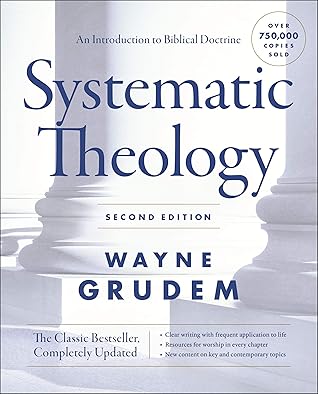More on this book
Community
Kindle Notes & Highlights
by
Wayne Grudem
Read between
March 15 - December 27, 2021
The dying Stephen prays, “Lord Jesus, receive my spirit” (Acts 7:59).
The Role of the Holy Spirit in Our Praying In Romans 8:26–27 Paul says,
Likewise the Spirit helps us in our weakness. For we do not know what to pray for as we ought, but the Spirit himself intercedes for us with groanings too deep for words. And he who searches hearts knows what is the mind of the Spirit, because the Spirit intercedes for the saints according to the will of God.
SOME IMPORTANT CONSIDERATIONS IN EFFECTIVE PRAYER
1. Praying according to God’s Will
Jesus encourages us to have his words within us as we pray, for he says, “If you abide in me, and my words abide in you, ask whatever you wish, and it will be done for you” (John 15:7).
“Nevertheless, if I am wrong in asking this, and if this is not pleasing to you, then do as seems best in your sight,” or more simply, “If it is your will.”
it is important in our prayer that we not only talk to God but also listen to him. We should frequently bring a request to God and then wait silently before him. In those times of waiting on the Lord (Pss. 27:14; 38:15; 130:5–6), God may change the desires of our heart, give us additional insight into the situation we are praying about,
2. Praying with Faith
as God gives us a sense of assurance that he has agreed to grant our request.
3. Obedience
Since prayer is a relationship with God as a person, anything in our lives that displeases him will be a hindrance to prayer.
Peter warns husbands to live “in an understanding way” with their wives, “so that your prayers may not be hindered” (1 Peter 3:7).
4. Confession of Sins
5. Forgiving Others
“Forgive us our sins, as we also have forgiven those who sin against us” (Matt. 6:12, author’s translation). If we have not forgiven others when we pray this prayer, then we are asking God not to restore a right relationship with us when we sin, just like we have refused to do with others.
6. Humility
“God opposes the proud, but gives grace to the humble” (James 4:6; also 1 Peter 5:5).
7. Continuing in Prayer over Time
“But we will devote ourselves to prayer and to the ministry of the word” (Acts 6:4).
8. Praying Earnestly
9. Waiting on the Lord
David says, “Wait for the LORD; be strong, and let your heart take courage; wait for the LORD!” (Ps. 27:14).
wait for the LORD, my soul waits, and in his word I hope; my soul waits for the LORD more than watchmen for the morning, more than watchmen for the morning. (Ps. 130:5–6)
10. Praying in Private
When we are truly alone with God, in the privacy of a room to which we have “shut the door” (Matt. 6:6), then we can pour out our hearts to him.
11. Praying with Others
12. Fasting Prayer is often connected with fasting in Scripture.
fasting appropriately accompanied prayer in many situations: in times of intensive intercession, repentance, worship, and seeking of guidance.
“Yet even now,” declares the LORD, “return to me with all your heart, with fasting, with weeping, and with mourning; and rend your hearts and not your garments.” (Joel 2:12–13a)
What about Unanswered Prayer?
as long as God is God and we are his creatures, there must be some unanswered prayers. This is because God keeps hidden his own wise plans for the future,
Prayer will also be unanswered because we do not always know how to pray as we ought (Rom. 8:26), we do not always pray according to God’s will (James 4:3), and we do not always ask in faith (James 1:6–
sometimes we think that one solution is best, but God has a better plan,
PRAISE AND THANKSGIVING
The model prayer that Jesus left us begins with a word of praise: “hallowed be your name” (Matt. 6:9).
the kind of thanksgiving that appropriately accompanies prayer must express thankfulness to God for all circumstances, for every event of life that he allows to come to us.
Angels What are angels? Why did God create them?
Angels have not always existed; they are part of the universe that God created.
Ezra says, “You are the LORD, you alone. You have made heaven, the heaven of heavens, with all their host . . . and the host of heaven worships you” (Neh. 9:6; cf. Ps. 148:2, 5).
That angels exercise moral judgment is seen in the fact that some of them sinned and fell from their positions (2 Peter 2:4; Jude 6;
angels are “spirits” (Heb. 1:14) or spiritual creatures, they do not ordinarily have physical bodies (Luke 24:39). Therefore they cannot usually be seen by us unless God gives us a special ability to see them (Num. 22:31; 2 Kings 6:17; Luke 2:13).
In their ordinary activities of guarding and protecting us (Ps. 34:7; 91:11; Heb. 1:14) and joining with us in worship to God (Heb. 12:22), they are invisible.
other terms for angels, such as “sons of God” (Job 1:6; 2:1), “holy ones” (Ps. 89:5, 7), “spirits” (Heb. 1:14), “watchers” (Dan. 4:13, 17, 23), “thrones,” “dominions,” “rulers,” and “authorities” (Col. 1:16).
three other specific types of heavenly beings named in Scripture.
The “Cherubim.”1 The cherubim were given the task of guarding the entrance to the garden of Eden (Gen. 3:24),
The “Seraphim.”
mentioned only in Isaiah 6:2–7, where they continually worship the Lord and call to one another, “Holy, holy, holy is the LORD of hosts; the whole earth is full of his glory!” (Isa. 6:3).
The Living Creatures.
Ezekiel and Revelation tell us of yet other kinds of heavenly beings known as “living creatures” around God’s thr...
This highlight has been truncated due to consecutive passage length restrictions.


